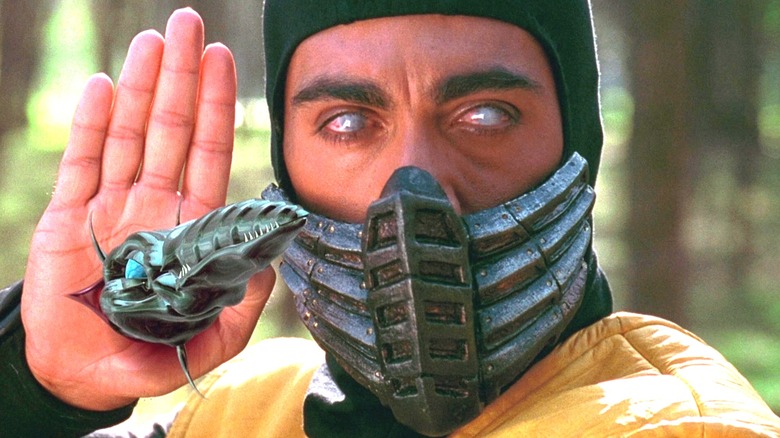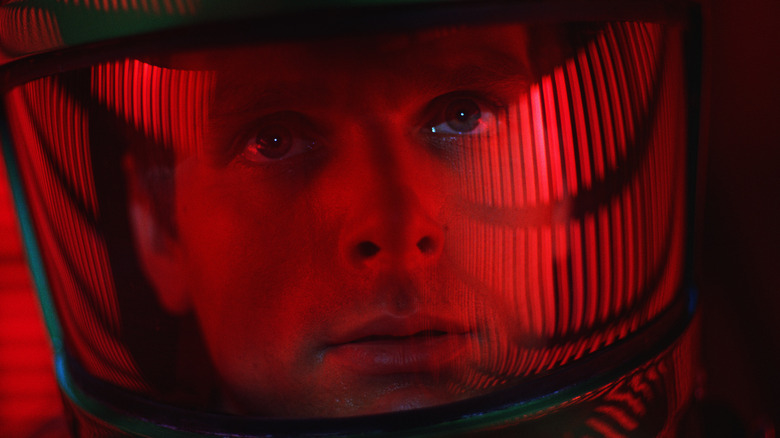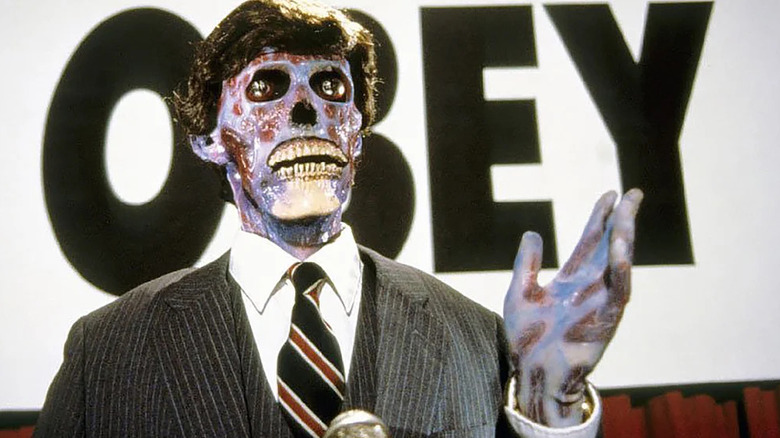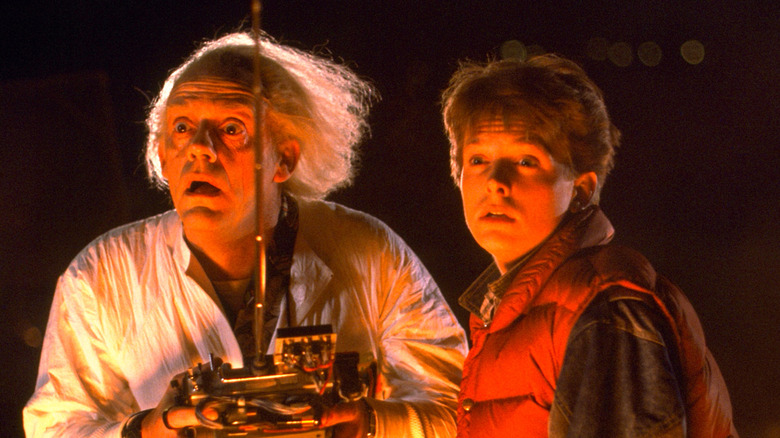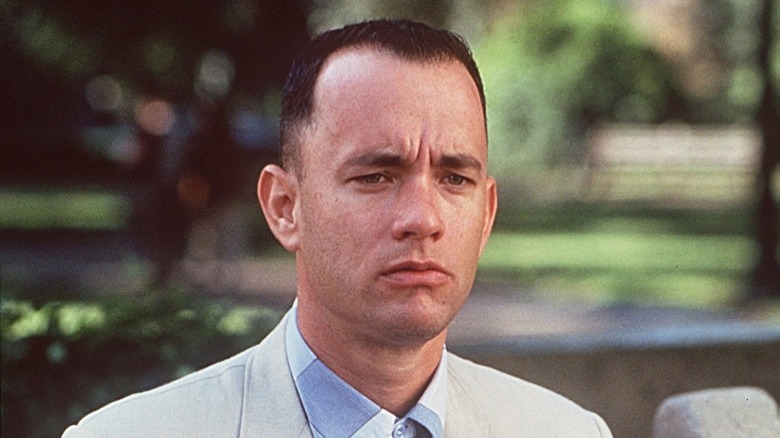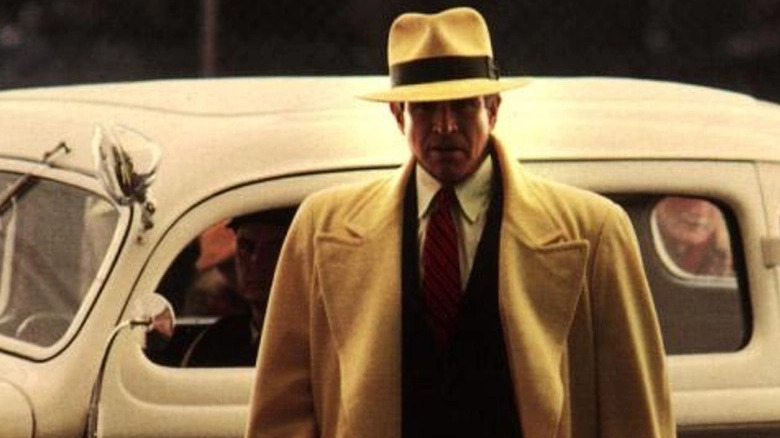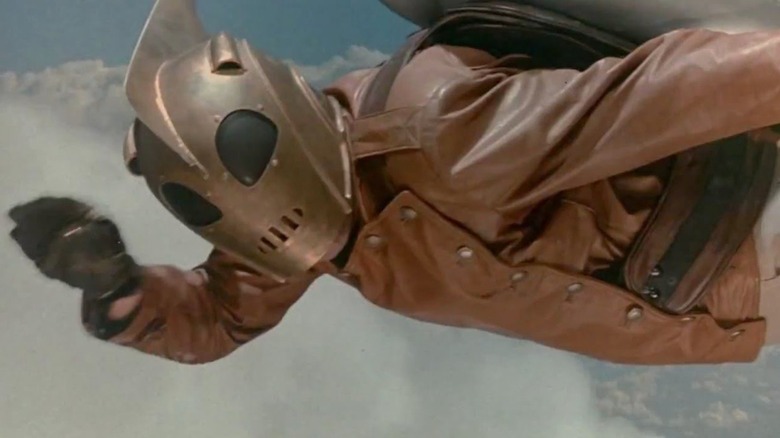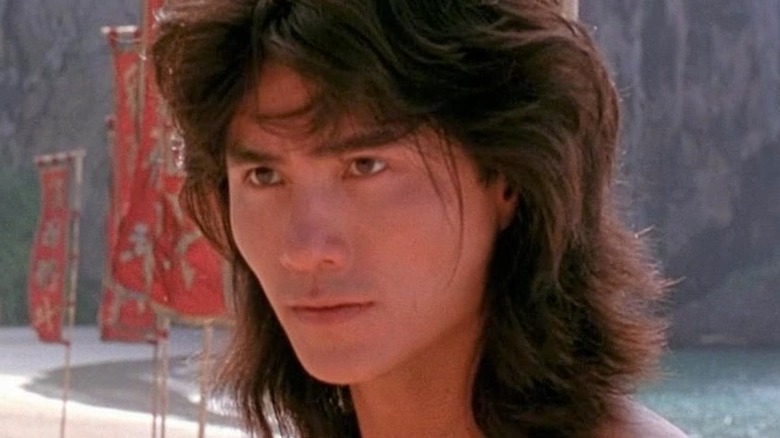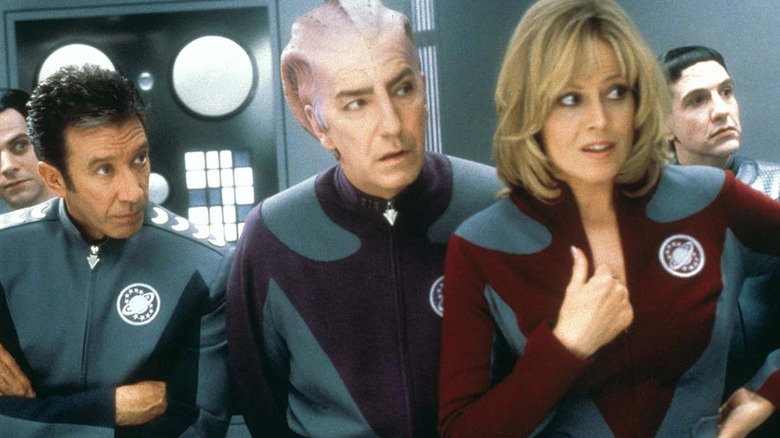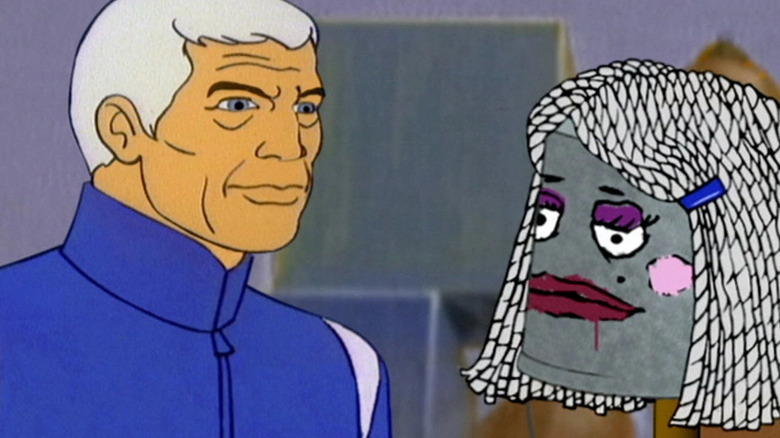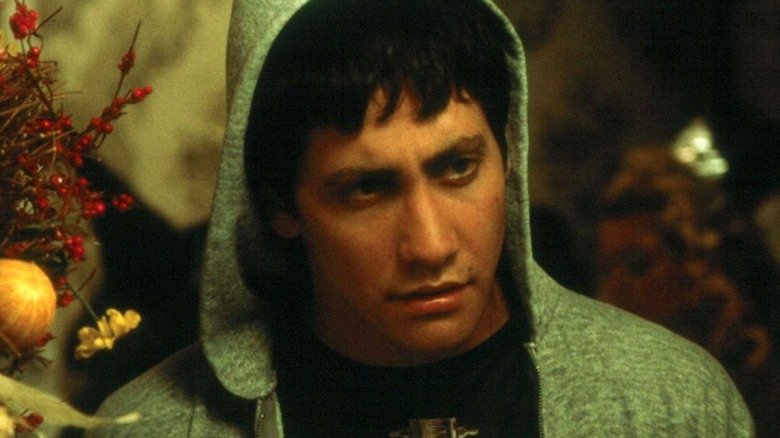Famous Franchises That Still Need Legacy Sequels
While adapting films based on intellectual property isn't anything new, the entertainment industry has nonetheless gotten increasingly more and more reliant on IPs and known quantities than ever before. Furthermore, the increased demand (at least from studios) has also led to an increase in what has been dubbed "the legacy sequel." Now, legacy sequels aren't necessarily a new thing in Hollywood either — Martin Scorsese's "The Color of Money" starring Paul Newman is actually a 25-year later sequel to "The Hustler," in which Newman plays the same character. What has changed, however, is the exponential regularity of legacy sequels being produced and released.
And, unfortunately, many — if not the vast majority — of legacy sequels are obvious cash grabs, or simply don't stack up to the originals at all. Which is a shame.
To be fair, though, a lot of recent legacy sequels have also been good-to-great as well. There was 2022's blockbuster "Top Gun: Maverick," which brought back Tom Cruise and Val Kilmer, breaking box-office records and arguably improving on the original; the underrated Denis Villeneuve-directed "Blade Runner 2049" from 2017, 35 years after the original; and 2015's critically-acclaimed "Star Wars: Episode VII: The Force Awakens," 10 years after the previous "Star Wars" film before it.
However, what are some franchises that could actually use –- or even benefit from — a legacy sequel? Find out below!
2001: A Space Odyssey
Stanley Kubrick's 1968 psychedelic sci-fi magnum opus "2001: A Space Odyssey" is highly regarded as a masterpiece, and with good reason. Not only were the revolutionary special effects by Donald Trumbull so realistic that they still hold up to this day, but the film is surprisingly prescient about how living in a space station would actually look. Meanwhile, the script -– co-written with Kubrick by acclaimed sci-fi author Arthur C. Clarke — is very cerebral and symbolic, touching on deep philosophical questions about the nature of humanity, the role of technology, and what it means to transcend and evolve.
The script was also written in a unique way, with the screenplay being developed at the same time as Clarke wrote the story's novelization. There are some differences between the two versions — for one, the novel is much less obtuse than the film, and more upfront about what's happening — but both the film and novel mainly follow the same basic plot beats. After the film, though, Clarke would go on to write multiple books in the "Space Odyssey" series, such as "2010: Odyssey Two," "2061: Odyssey Three," and "3001: The Final Odyssey."
In fact, 1984's "2010" film adaptation isn't half bad either. While not necessarily stacking up to Kubrick's film — what could? — it still manages to be compelling and thought-provoking. It would be really cool to see what modern special effects could accomplish with Clarke's other entries in the series, which get even more psychedelic and cerebral.
They Live
John Carpenter's action-packed 1988 sci-fi satire "They Live," starring Roddy "Rowdy" Piper and Keith David, is a classic for a reason. It smartly skewered the opulent consumerism and the increasing wealth disparity of capitalism run amok during the height of Reaganomics in the 1980s. The story is packed with gruesome aliens, five-minute-long fight scenes, and epic one-liners.
The film itself is about a poor, working-class drifter (Piper) who finds a pair of magical sunglasses that let him see the truth of his world – it is run by evil aliens, who look human but are secretly ghoulish extraterrestrials, subjugating the people of Earth and pilfering the planet's resources. You know, as capitalists do. Furthermore, all billboards say things like, "Consume," "Obey," etc., while even the money reads "This is your God."
What's great about the ending of "They Live" is that's left pretty open-ended. While Piper's drifter is able to send a signal that reveals the aliens to the public, there are still some lingering questions for a potential legacy sequel. Like, how widespread was the signal? In the short story the film was based on — "Eight O'Clock in the Morning" — it's implied a global war against the invading aliens is waged afterward. Maybe we can see some of that? Even better, the sequel could showcase more fun satirical alien propaganda to get people on the aliens' side, with the humor coming from how — like in real life — people can be convinced to work against their own interests.
Back to the Future
In 1985, Robert Zemeckis made an all-time classic with the time-traveling family sci-fi "Back to the Future." It stars a fresh-faced Michael J. Fox as the quintessential '80s teen Marty McFly, alongside Christopher Lloyd as the eccentric mad scientist Dr. Emmett Brown. The film follows Marty as he travels back to 1955 with the use of Doc Brown's time machine, which he made into a DeLorean so he could "travel in style." In 1955, Marty befriends his nerdy dad (Crispin Glover), since — due to time shenanigans — they're now the same age, and also gets French kissed by his mom (Leah Thompson) at one point. You know, good clean family fun.
Anyway, the film spawned two sequels in 1989 and 1990. There was also a Saturday morning cartoon series, a Universal Studios ride, and a Telltale video game that — despite the involvement of the film's co-writer Bob Gale — all have dubious canonicity. However, there are still so many possibilities to explore with the franchise — especially now that we're past the then-future 2015 seen in the second film. That film even brought up multiple timelines and universes just waiting to be explored.
De-aging VFX technology has also made leaps and bounds in the last few years, and it could step up what could be done with actors interacting with each other. Furthermore, history is vast and endless – who knows what time period these characters could end up in. And Marty's kids — we could see what happened to Marty's kids!
Forrest Gump
"Forrest Gump" is another film from director Robert Zemeckis that could use the legacy sequel treatment. The 1994 film was a boomer fever dream, as it starred Tom Hanks as a man who finds himself in the midst of all the most turbulent points in the 20th Century.
The film was based on a novel of the same name — written by author Winston Groom — which had a more cynical and satirical tone compared to the movie. For one thing, Forrest was far more belligerent, hateful, and even racist in the original novel. The events were also much more ridiculous, including Forrest going into space with an ape, and later getting captured by cannibals. There was even a sequel novel from Groom — who wasn't a fan of the film adaptation — making it partly a scathing indictment of Hollywood since there's a subplot about Forrest's life story being adapted into a biopic. Tom Hanks and Zemeckis also considered making a "Forrest Gump" sequel, but talks didn't last long (via Variety).
Now that plenty of time has passed, perhaps Forrest could explore big events of the last 20 years, whether it's the Iraq War, Occupy Wall Street, or even the recent rise in fascism across America and the ensuing protests to try and curtail it. Even better if the sequel would take on some of the novel's original acerbic tone, particularly if it was to deconstruct and deflate the Boomer nostalgia the original "Forrest Gump" film pedaled.
Dick Tracy
The "Dick Tracy" newspaper strip — debuting in 1931 by artist Chester Gould — is about a hard-nosed detective wearing a bright, yellow trenchcoat, who fought off grotesque gangsters that physically looked like their nicknames (i.e. Flat Top is a guy whose head is literally flat). The strip eventually got a big-budget film adaptation in 1990, perhaps hoping to follow the success of Tim Burton's 1989 "Batman" film. The film performed well, earning over $160 million at the worldwide box office.
The "Dick Tracy" film has an undeniably unique aesthetic, with director/star Warren Beatty utilizing only the four colors used in the comic strip for the costumes, props, and sets, giving everything a bright and colorful look (via The Hollywood Reporter). The film also won an Academy Award for best makeup, using state-of-the-art prosthetics to transform the all-star cast — which included Al Pacino, Dustin Hoffman, and Madonna — into the inhuman gangsters from the strips.
While filmmakers could go the reboot route, it might be better to maintain the original "Dick Tracy" film's distinctive four-color look and make the film a legacy prequel, rather than a sequel. This would also have the benefit of allowing for the return of many of the famous Dick Tracy villains -– such as Flat Top, Prune Face, and Itchy — who were all killed at the end of the first "Dick Tracy" film.
The Rocketeer
"The Rocketeer," directed by Joe Johnston ("Captain America: The First Avenger"), is based on the 1982 comic of the same name, itself inspired by the pulp sci-fi retro-future adventure serials of '30 and '40s. The film adaptation starred Bill Campbell as hot-shot ace test pilot Cliff Secord, the eponymous "Rocketeer," with Jennifer Connelly playing his vivacious love interest Jenny, and Timothy Dalton as a dashing Hollywood star, who turns out to be a secret Nazi spy.
While "The Rocketeer" crashed and burned at the box office, it has since gained a deserved cult following in the ensuing decades. It's not hard to see why — it's a fun, old-school swashbuckling adventure, with a great retro design aesthetic for the Rocketeer's outfit. The special effects and stunt work are also a marvel, especially considering how most of it had to be done practically at the time.
There are many directions you could go in with a "Rocketeer" legacy sequel. You could set it around same time period, but follow the child of Cliff and Jenny instead. Or you could set it around 30 years later, around the mid-'70s. If so, you could comment on the Vietnam war and have the black-and-white morality of The Rocketeer coming face-to-face with that morally ambiguous conflict. Or you could even set it in modern times, with a descendant or someone else finding the suit again. All could be interesting in their own right. As long as you don't change the look of his cool suit. We beg you.
Mortal Kombat
The "Mortal Kombat" video game was a phenomenon when it was first released to arcades in 1992, and even more so when it came to home consoles a year later, coining the term "Mortal Monday," which is still being used today. So it made sense that Hollywood would eventually come knocking. At the time, though, even the creators of "Mortal Kombat" thought that was a far-fetched idea. Luckily, the 1995 live-action was a massive financial success (via Box Office Mojo).
Unfortunately, after the film's sequel "Mortal Kombat: Annihilation" got fatalitied at the box office, the proposed third movie never happened. Even worse, the subsequent cinematic adaptation didn't happen again until 2021, with a reboot starring Lewis Tan as ... some guy who wasn't in the games and shouldn't have been in the movie. To add insult to injury, the reboot failed at so many things. It had an overly self-serious tone (with its stabs at humor being obnoxious and out-of-place), it over-complicated an already complicated mythology with its Arcana nonsense, and its attempts at gore were mired by the dire CGI.
However, it would be amazing to pretend the 2021 remake didn't happen, and we could get a proper sequel to the '95 "Mortal Kombat" film – possibly even pulling a "Halloween (2018)" and pretending "Annihilation" doesn't exist either. As for continuing the story, you could follow the games, creating a "Mortal Kombat X" type legacy sequel based on the 1995 film cast, bringing in characters like Cassie Cage, Jacqui Briggs, and Takeda into the mix.
Galaxy Quest
"Galaxy Quest," a loving parody of "Star Trek," has garnered a devoted cult following since its release in 1999. The cast is amazing, and everyone is doing some of their best work, including Tim Allen, Sigourney Weaver, Alan Rickman, and a star-making turn from the then-unknown Sam Rockwell.
The story follows a group of actors from the titular cheesy sci-fi show — inspired by the aforementioned "Star Trek" — that has long since been canceled. The actors are now all washed up, and mostly work at conventions or corporate events. That is until a group of aliens — who mistake their TV show for historical documents — beams them up to a recreation of the show's Enterprise-esque spaceship to fight off a real-life alien dictator. Hilarity, action, and even some heart-wrenching moments ensue.
While there is supposedly already a "Galaxy Quest" sequel reboot in the works from Paul Scheer, its development has been up and down over the years (via Gizmodo). Due to the fact that aliens exist in that universe, there's no telling what kind of adventures the crew could potentially get into. Furthermore, the end of the first film shows that a new in-universe "Galaxy Quest" reboot was produced, and — going off of the trajectory of our universe's "Star Trek" — could have spawned a massive media empire since the late-'90s, which could cause some interesting situations and conflicts of interest for the characters.
Sealab 2021
One of Cartoon Network's first original pieces of programming was "Space Ghost: Coast to Coast," which debuted in 1994 and presented a surreal talk show hosted by the eponymous washed-up animated superhero. This eventually led to the advent of Adult Swim in 2001, laying the foundations for a block of programming late at night that catered to, well, more adult audiences. Among its first batch of shows was "Sealab 2021."
Like "Space Ghost: Coast to Coast" before it, "Sealab 2021" used mostly repurposed animation from an old cartoon, in this case from the barely-remembered show "Sealab 2020." The original 1972 cartoon was about a team of scientists living in a high-tech underwater base working to help save the environment. The fact that the Adult Swim reboot is titled "Sealab 2021" and not "2020" implies that the eccentric crew have lost their minds after being stuck in the underwater facility for a year. The reboot lasted for four seasons from 2001 to 2005.
Now, with multiple Adult Swim shows, including "Aqua Teen Hunger Force" and "Metalocalypse," making years-later comebacks, it would make sense for "Sealab" to get one too. The show was definitely a stand-out among the original line-up, with classic lines and truly absurd plotting (including an episode where Captain Murphy falls in love with a mop). It'd be especially interesting to see how the writers would handle the fact that it's been over 20 years since the show's debut, and that the title itself is now outdated. Sure, not everything on the show aged well (honestly, most humor from the early-to-mid-2000s hasn't), but there are still episodes that remain classics to this day, and it would be refreshing to see what the characters have been up to in the interim.
Donnie Darko
"Donnie Darko" was the feature debut of director Richard Kelly. It is a dark, Lynchian sci-fi teen thriller set in 1988 about a creepy, time-travelling, human-sized bunny with a skull face named Frank (James Duval), who visits the mentally-ill Donnie Darko (Jake Gyllenhaal), asking him to stop the end of the world. The film itself is stylish and trippy, with a great soundtrack, as well as being a perfect aesthetic distillation of early-2000s existential ennui (despite being set in the '80s).
However, the end of the movie is a bit ambiguous — how exactly did Donnie save the world? Was it all in his head? Did he actually save the world? The mechanics of time travel are certainly explored within the film, but there are a lot of ways things can be interpreted (especially vis-a-vis how the role of fate and God plays into everything). It would fun to explore the film's universe after Donnie's death by time-travelling airplane engine.
Now, it must be mentioned that there was actually a direct-to-DVD sequel to "Donnie Darko" from 2009 called "S. Darko," following Donnie's younger sister from the first film, played once again by Daveigh Chase. But even if this theoretical "Donnie Darko" legacy sequel were to exist alongside "S. Darko," it would still technically be a legacy sequel, regardless.
